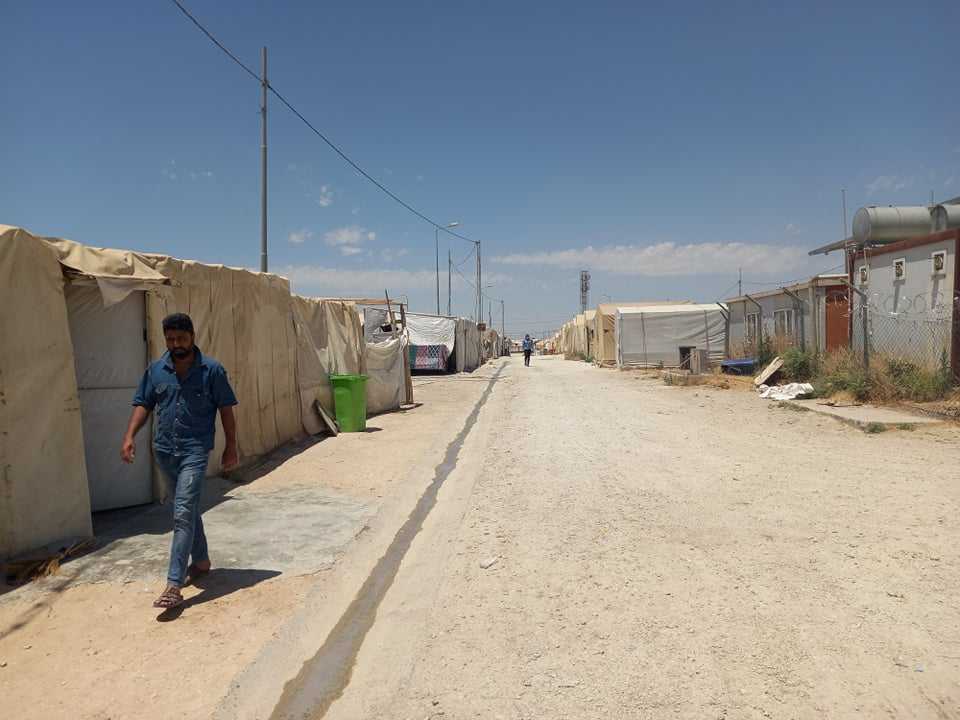Rayan Fares is living in a closed circle in Khanke camp for the internally displaced people IDP in Duhok northern province. He was dreaming of a better life in Germany which deported him to Iraq, where he is jobless again.
The German government has occasionally deported a number of Iraqi refugees, including the Ezidis, who have tried to be treated differently because of the atrocities committed by the extremist militants of the so-called Islamic State of Iraq and Syria ISIS against the non-muslim, tolerant Ezidi community
Rayan Fares, 25, left the Kurdistan Region of Iraq KRI for Belarus in August 2021 after an agreement with a smuggler. A month later, the smuggler smuggled him into Germany for $12,800.
“When I arrived in Germany, I was very happy. I said I could work here and live well without fear,” Rayan said. Three months after arriving in Germany, he surrendered, hoping to be granted asylum. During that time, he worked daily to support himself.
When I arrived in Germany, I was very happy. I said I could work here and live well without fear
Before moving to Germany, he was living in Khanky IDP camp in the KRI until early 2021, and had no desire to return to Shingal (Sinjar), home for the Ezidis, because of the situation, which the IDPs describe as "unstable."
He was kept in a camp near Oldenburg in Germany, waiting to receive asylum, but says he heard the worst news of his life when he learned that the German government was deporting Iraqi refugees.
"I moved to Germany for a better life because I had no job here in Iraq. I thought we could find good jobs in Germany," Rayan recalls.
Germany, a so-called refugee country, has intensified its campaign to send Iraqi refugees back for several years and the number of Iraqis deported is increasing year by year. Only 77 Iraqis have been deported by Germany in 2022, for 164 in 2023.
Germany is the second home of most Ezidis in the world, after Iraq. Some sources estimate there are 250,000 Ezidis in the country.
In August 2014, Daesh took over Shingal and took 6417 Ezidis as captives and sex slaves, mainly women and children. Up today, 2781 of them are missing and brought to unknown destiny, the Kurdistan Regional Government’s KRG office for rescue of the abducted Ezidis.
Ezidis are a non-Muslim ethno-religious minority of about 550,000 people, mostly residing in Shingal, in northern Iraqi province of Nineveh. The militants of Daesh extremist group in 2014 attacked their communities, killing thousands of men and taking thousands of women and children, in an atrocity the U.N. said amounted to genocide.
IS reportedly used the women and girls as sex slaves. Tens of thousands of Ezidis are still living in Internally Displaced Person IDP camps in Iraqi northern province of Duhok.
Amid the atrocious attacks of IS, 1,293 Ezidis were killed, 68 shrines were destroyed and over 80 mass graves have been discovered.
According to unofficial statistics, the deportation of Ezidis from Germany to Iraq in the past three years has reached about 300 people, but the problem is that some of the returnees cannot earn a living, due to unemployment, putting more economic and psychological pressure on most of the deportees.
Rayan, whose attempt to change his life failed, has now returned to Khanke camp and says he has to cover a debt of at least $15,000, the cost of his illegal trip to Germany.
The fate of the Ezidis during the war against ISIS was an important issue for European countries, especially in Germany. In December 2023, Bundestag, the German parliament, recognized the crimes committed against the Ezidis as genocide.
In the spring of 2023, the German federal government refused to deport the Ezidis to Iraq. But since then, deportations of Iraqis, including Ezidis, have increased.
In 2017, the first judge in Germany ruled that the Ezidis were no longer the target of “mass repression” in Iraq – since ISIS had been eliminated. Meanwhile, the situation of newly arrived refugees has worsened – with large numbers of Iraqi refugees now being deported, including Ezidis.
“I was one of the Iraqis deported,” said another Ezidi man who asked to stay anonymous. He also left the Sharia camp in Duhok province for Germany in 2021 and was returned to Iraq from Frankfurt less than two years later.
“According to the law of the region, any refugee who has not completed three years of stay there will be deported.
Though he has an engineering degree, but says there is no work in Iraq, so he chose to go to Germany, spending more than $ 10,000.
There is a contradiction in this issue, because while they emphasize the lack of job opportunities, but to reach Germany spend $ 10,000 to $ 20,000.
He is currently living with his brother in Shingal and has no job. "All the Ezidis in Germany know there was nothing to do in Shingal, so we head to Germany," he added.
The Iraqi government will give a piece of land and an amount of cash money to each Iraqi refugee who is deported, but the decision does not apply to citizens living within the provinces of the KRI.
Germany supports the plan of the Iraqi government to urge Ezidi IDPs to Shingal. "Germany is committed to supporting the government's efforts to achieve this goal," German Ambassador to Iraq Christiana Human said in a meeting with Iraqi Prime Minister's Advisor on Ezidi Affairs Khalaf Shingali on May 11.
According to KirkukNow's previous investigation, the main reasons for the migration of the Ezidis were the devastation of their homeland by the war against ISIS, lack of stability and services, and the difficulties of living under tents as Internally Displaced Persons IDP.
Stories by KirkukNow found out that hundreds of families suffer from lack of assistance, lack of drinking water and poor food distributed by the Iraqi government while over 664,000 IDPs are still living under tents at the IDP camps in the Iraqi Kurdistan Region IKR, 30% of whom are Ezidis.
Pir Dayan Jaafar, Director of KRG Migration and Crisis Response, said, "We have registered 100 Ezidis deported by the German government, but we do not have the accurate figures of all the Ezidis who have been deported, because some of them went directly from Baghdad to Shingal and did not return to the camps.
We alone have registered 100 Ezidis who have been deported by the German government
"Those who are deported from Baghdad airport, the government will provide financial support as well as a piece of land to stand back on their feet and try to find job opportunities, but does not cover those who come back through the Kurdistan Regional Government.”
The Supreme Spiritual Council of the Ezidis has tried several times for Germany to exclude the Ezidis from deportation of Iraqis, Khidir Dero, an advisor to the Ezidi Spiritual Council, told KirkukNow.
"The Ezidis have rights over the whole world, because of the genocide they faced, despite all this, some of them are being deported, we call for the situation of the Ezidis in Iraq to be taken into account," he said.






